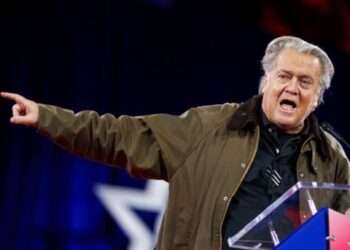Bannon: “All Bushes And Bush Related People, You Suck”
On Thursday evening’s WarRoom, Steve Bannon delivered a fiery critique of former President George W. Bush’s behavior at Jimmy Carter’s state funeral. Bannon highlighted Bush’s blatant snub of Donald Trump, walking past the former president without acknowledgment. In contrast, Bush leaned into Barack Obama with a jovial jab, which Bannon described as classless and disrespectful.
Bannon criticized the Bush family and their allies for lacking integrity and responsibility, particularly over their role in national crises like the Iraq War, 9/11, and the 2008 financial collapse. He labeled Bush as one of the worst presidents in U.S. history, second only to James Buchanan. Bannon also took aim at other establishment figures, including Karl Rove and Mike Pence, accusing them of spinelessness and betrayal of MAGA values.
Bannon’s sharpest condemnation was reserved for the use of John Lennon’s Imagine—a song he called "atheistic” and "depraved”—at the National Cathedral during the funeral. He framed the moment as emblematic of the cultural decline MAGA seeks to reverse. Despite the slight to Trump, Bannon underscored that Trump’s focus remains on his mission to save the country, standing above the pettiness of his detractors.
Part One:
Bannon BLASTS The Use Of ‘Imagine’ By Degenerate John Lennon At President Carter’s Funeral
Part Two:
Julie Kelly On If President Trump’s Sentencing Will Move Forward Tomorrow Morning
Steve Bannon and Julie Kelly delved into critical updates on legal challenges facing Donald Trump, focusing on tomorrow’s scheduled sentencing in New York and developments in Florida regarding Jack Smith’s report. Bannon noted Judge Merchan’s likely prepared condemnation of Trump during sentencing, emphasizing the political underpinnings of the case. Kelly highlighted that Supreme Court Justice Sonia Sotomayor, overseeing an emergency stay application, has yet to act, raising concerns about potential partisan motivations.
The discussion shifted to Jack Smith’s controversial draft report, intermingling classified documents and January 6 cases, which Trump’s legal team is trying to prevent from being publicized. The 11th Circuit granted Trump’s request to file an amicus brief, and Judge Cannon issued an order temporarily blocking the DOJ from sharing the report outside its ranks. Kelly explained that co-defendants in the Mar-a-Lago case have requested further hearings, adding complexity to the legal battle.
Bannon and Kelly criticized Jay Bratt, a former DOJ prosecutor tied to the Mar-a-Lago raid, accusing him of partisan motives and unethical practices. Bratt recently resigned after a controversial career.
The conversation underscored the politicization of Trump’s legal challenges, the liberal judicial bias alleged by Kelly and Bannon, and the broader implications for 2024. Kelly concluded with updates on her platforms, promising real-time coverage as these pivotal events unfold. Both commentators framed the legal struggles as emblematic of ongoing political warfare targeting Trump and his allies.
Abraham George Details The Texas House Speaker Race
Steve Bannon hosted Texas Republican Party Chairman Abraham George to discuss key political tensions in Texas, particularly the House Speaker’s race and its implications for conservative governance. They highlighted grassroots MAGA supporters’ significant contributions in securing Republican victories, emphasizing Texas as a stronghold for the movement. The conversation turned to George W. Bush’s perceived snub of Donald Trump at the National Cathedral, which George criticized as disrespectful, especially in Trump-supporting Texas.
The discussion delved into longstanding issues with Texas House leadership. George explained that moderate Republicans have historically aligned with Democrats to select the Speaker, granting Democrats influential committee positions that hinder conservative legislation. He noted grassroots efforts demanding the Speaker be chosen solely by Republican caucus members to advance the party’s priorities.
Bannon and George emphasized the immense power of the Texas House Speaker, who controls critical legislative outcomes. While George outlined grassroots strategies to address the problem, the conversation was cut short, leaving the solution incomplete. Bannon underscored the stakes, portraying the situation as a microcosm of broader political battles, including resistance against the Bush political apparatus and establishment forces undermining MAGA’s agenda.
Natalie Winters: “This Isn’t A Natural Disaster. It’s A Political Failure”
Natalie Winters talked about the failures of Gavin Newsome and the Democrats in California that led up to a disastrous result with the most recent fire damage to property.
Jeremy Kauffman Breaks Down The Financial Insurance Aspect Of The LA Fires
Jeremy Kauffman argues that the left denies reality and then becomes angry when the consequences emerge. He highlights this in several areas, including diversity initiatives, forest management, and insurance markets, particularly in California. Kauffman criticizes policies that ignore merit, such as prioritizing inclusivity over competence in critical roles like firefighting, leading to predictable adverse outcomes.
On the insurance market, Kauffman points out that California’s law restricting insurers to using only historical data for pricing prevents them from accounting for future risks, like increasing wildfire threats. As a result, insurers, unable to charge appropriate premiums for high-risk areas like the Palisades, dropped thousands of homeowners, as insurance is a business and not a charity.
Kauffman also criticizes environmental policies that prevent effective forest management, leading to a buildup of fire risks. He predicts that California politicians will scapegoat insurance companies, demand bailouts, and impose further regulations instead of addressing the root causes, perpetuating a cycle of denial and failure.
Savanah Hernandez On The State Of LA During The Fires: “These Are 3rd World Conditions”
Savanah Hernandez highlights California’s severe wildfire crisis and the state government’s failures in fire prevention and response. During her visit to San Diego, she witnessed homeless encampments as sources of fires, which often grow into massive, destructive blazes. She then traveled to Altadena, where residents faced devastating fires without sufficient firefighter presence or preparation despite prior warnings about strong winds.
One resident recounted watching fires rage for over an hour before evacuating, with no fire crews or helicopters responding due to the winds. Many locals resorted to protecting their homes with personal sprinklers and hoses. In one case, a woman was blocked by police from delivering fire hoses to her property. Hernandez criticized California’s outdated infrastructure, noting no new water reservoirs have been built since the 1980s.
She also pointed to government negligence, such as Los Angeles Mayor Karen Bass being abroad during citywide evacuations, and the lack of forest and fire management. Hernandez highlighted frustrations among residents paying high taxes but receiving little help. Many suspect some fires were intentionally set, and she emphasized the role of homelessness in contributing to fires, exposing systemic mismanagement and misplaced priorities in the state.
Natalie Winters: “Lawfare Is Not Going Away, They’re Just Rebranding”
Natalie Winters talked about the likelihood that Lawfare is not going to simply go away when President Trump gets back to the White House, as Jack Smith and Judge Merchan are attempting to box Trump in, and label him a felon, before the 20th when Trump will be sworn in as the 47th president of the US.

![Bannon’s WarRoom, Show Clip Roundup 11/4/2024 [AM]](https://warroom.org/wp-content/uploads/2024/11/bannonsteve_022424gn06_w-350x250.webp)


